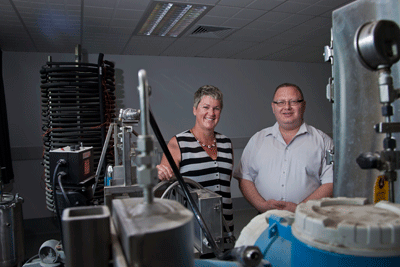A new food processing laboratory at The University of Auckland’s Tamaki Campus will help to scale up research into innovative, commercially feasible processes and technologies.
The new laboratory is a collaboration between the University and Plant & Food Research that combines Plant & Food’s pilot plant equipment and the non-thermal processing equipment previously housed at the University’s city campus.
The combined $3 million facility is expected to develop and foster new collaborative projects between the two organisations.
It will also support New Zealand food companies, in order to understand the fundamental science behind existing products and processes.
A wide range of food processing projects will be carried out using the new state-of-the-art equipment such as extraction, fractionation, pasteurisation, sterilisation, evaporation, drying and the formulation of different food and ingredients from various resources and by-products.
The partnership is consolidated further by the appointment of Dr Zaid Saleh from Plant & Food Research to the university’s Department of Chemical and Materials Engineering, and by Professor Murat Balaban, chair of Food Process Engineering, who will hold an adjunct position at Plant & Food.
Dr Saleh says – “The presence of the food process engineering group, the new processing facility, and Plant & Food Research personnel at Tamaki will fill the gaps between the wine science group and the materials science group, by providing food engineering and processing capabilities to help scale up their existing techniques and processes specifically in winemaking and food packaging, and also support them with commercial application.
“The collaboration will be highly regarded by the academic sector as it will provide the university with unique capabilities and strong leadership in the food processing area among other New Zealand institutes and universities. It will help to attract more postgraduate students who are eager to use the latest technologies and have the hands on experience which is essential throughout the programme.”
The laboratory will be used by both Plant & Food and university staff, as well as postgraduate students. More than nine Masters of Engineering students’ projects, three fourth year projects and two large MBIE research programmes will be utilising this facility once all the equipment is in place.
The main aims of the research projects are to recover and isolate functional ingredients at higher yields and maximum biological activity, and to formulate and deliver new health or functional food products for the wellness market.
The two organisations are planning an opening ceremony to publicise the new facility, inviting key industry people and scientists from many organisations in Auckland and around New Zealand.

































































































